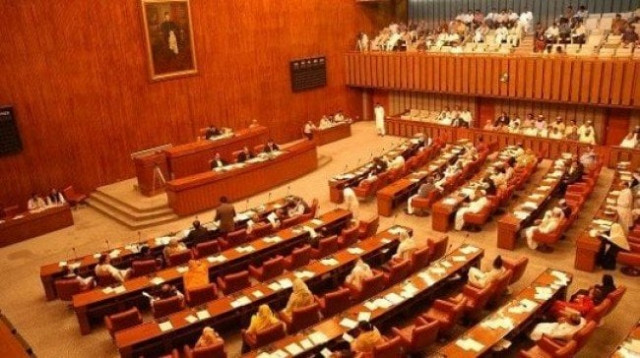Senators lament elite’s merrymaking
Note upper echelons enjoy massive salaries, while labourers can’t afford two meals a day

The Senate on Friday discussed a class contradiction in the country’s workforce, lamenting the fact that those who were in the upper echelons enjoyed massive salaries and perks, while the minimum wages meant for the labourers in the lowest rung were not even enough for two meals a day.
During the session, chaired by Senate Chairman Sadiq Sanjrani, many senators raised objection to the salary package of the State Bank of Pakistan (SBP) governor and other employees.
Senator Danesh Kumar said that the salary of the SBP governor and employees got up to Rs4 million.
Senator Palwasha Khan said what was the work done by a person getting a salary of Rs4 million.
Read More: 95m Pakistanis live in poverty: World Bank
Caretaker Finance Minister Dr Shamshad Akhtar told the upper house that the salary structure of the central bank employees was very different across the world.
Shamshad said that salaries in the banking sector had gone very high therefore it was important that the SBP’s salary structure be made lucrative.
“The State Bank introduced a policy that salary would be increased in case of termination of pension. This policy was introduced when the State Bank's pension burden was on the rise,” she said, adding that the salary structure of central banks across the world varied.
Read More: Federal govt ups salaries of its workers by 30%-35%
Senator Raza Rabbani said it seemed that now classes had been created even in the elite class.
Salaries of the elite were being increased at an immeasurable rate, while a common man’s salary of Rs32,000 per month was not enough for two meals a day.
“Even the elite class is not ready to pay Rs32,000 per month [minimum wage] to the labourer. The announcement [about the minimum wage] was made but it is not being implemented,” the senator from the Pakistan Peoples Party (PPP) lamented.
Rabbani said that on the one hand, “we hear that the rates of electricity and gas have been increased on the advice of the IMF (International Monetary Fund), but on the other, our own government’s extravagant expenses have not been curtailed”.
Senator Mushtaq Ahmed of the Jamaat-e-Islami also expressed similar views, saying that those who were sitting in government offices and living in official residences in Islamabad alone enjoyed free electricity worth Rs10 billion annually.
Shamshad replied that the secretaries of all ministries had been told to control such expenses.
When some members spoke about corruption in government departments, Information Minister Murtaza Solangi cautioned lawmakers against calling one government institution a hotbed of corruption.
“From the first speech of Quaid-i-Azam Muhammad Ali Jinnah on August 11, 1947, the issue of corruption has been included in our speeches. If the honourable senator has any evidence regarding corruption in this institution, please let us know. Investigations will be conducted,” he said.
The house was informed that the Pakistan Council of Research in Water Resources (PCRWR) had declared 20 brands of water as harmful to health in its quarterly report for April-June 2022, including two brands registered with the Pakistan Standards and Quality Control Authority (PSQCA).
The minister-in-charge said that action was taken against these two licensed brands and their production was stopped.
“Action was taken against them [the remaining 28 brands], according to the PSQCA law. Unlicensed persons were fined Rs50,000 and sentenced to one year by the relevant courts.”



















COMMENTS
Comments are moderated and generally will be posted if they are on-topic and not abusive.
For more information, please see our Comments FAQ